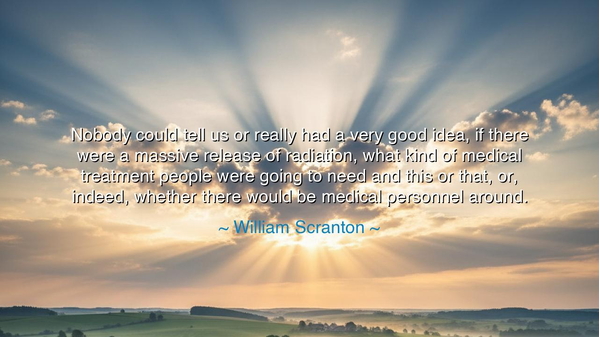
Nobody could tell us or really had a very good idea, if there
Nobody could tell us or really had a very good idea, if there were a massive release of radiation, what kind of medical treatment people were going to need and this or that, or, indeed, whether there would be medical personnel around.






In the voice of William Scranton we hear the tremor of dread and the humility of human unpreparedness: “Nobody could tell us or really had a very good idea, if there were a massive release of radiation, what kind of medical treatment people were going to need and this or that, or, indeed, whether there would be medical personnel around.” These words arise not from speculation but from the shadow of the Three Mile Island nuclear accident, when leaders, citizens, and experts alike confronted the terrifying possibility of disaster without precedent. His reflection reveals the ancient truth that there are moments when human knowledge falters, when our inventions exceed our wisdom, and when we are left vulnerable before forces we ourselves have unleashed.
The core of his statement is the unknown nature of radiation. Unlike fire or flood, which mankind has faced for millennia, radiation is invisible, tasteless, silent, and insidious. It does not roar or crack like thunder, but seeps into bodies unseen, altering cells, corrupting the very essence of life. In Scranton’s words, we hear the helplessness of a people asking: What happens if this force escapes? How do we heal the afflicted when we scarcely understand the harm? The absence of answers was itself a terror, for it stripped away the illusion that man always masters what he creates.
The uncertainty of medical treatment in such a catastrophe underscores humanity’s limits. Doctors are healers of flesh, but how to heal the invisible poisoning of marrow and blood? In Hiroshima and Nagasaki, survivors bore wounds that confounded medicine: burns fused with sickness, cancers arising decades later, children born frail. Scranton reminds us that in the late twentieth century, even with all our progress, the art of healing had not yet caught up with the dangers of our own machines. The tragedy is not only the event itself, but our unpreparedness to answer it.
History echoes this pattern: when the plague first struck medieval Europe, physicians groped in darkness, unable to explain or to treat. The people turned to prayer, superstition, and despair, for their knowledge had not yet matched their need. So too in the age of nuclear power, when the atom was split and harnessed, but the wisdom to guard against its wrath was incomplete. Scranton’s lament is part of this eternal story: that mankind is often swift to discover and slow to prepare.
His words also draw attention to the fragility of medical personnel themselves. For in disaster, the healers are not immune. If radiation sweeps through the land, doctors and nurses may fall ill alongside those they would save. What good is treatment if the healers themselves are stricken? Thus the crisis deepens: not only are remedies uncertain, but the very guardians of health may be unable to stand. In this recognition is a sobering reminder that no system is invincible, and that even those we rely upon most can be swept away.
The deeper meaning is that human pride must be tempered with foresight. To unleash mighty forces—whether of the atom, of technology, or of power—without knowing how to contain or to heal them is to court catastrophe. Scranton’s words are not only about nuclear accidents, but about the broader folly of running ahead with invention while leaving preparation behind. It is a call for humility, for wisdom to grow in proportion to power, and for societies to ready themselves for dangers they hope never to face.
The lesson is clear: we must never presume that progress alone is safety. We must study, prepare, and plan for the worst even as we strive for the best. In our own lives, this means looking honestly at the risks we face, not turning away from the uncomfortable, and ensuring that knowledge is coupled with responsibility. Support systems of emergency preparedness, value the training of healers, and respect the delicate balance between human ambition and nature’s wrath.
Thus, William Scranton’s words echo like a warning bell across the ages. They remind us that wisdom is not only in creating, but in foreseeing. They teach us that the time to prepare for disaster is before it arrives, not after. And they charge us with the sacred duty to ensure that our children inherit not only the fruits of human genius, but also the foresight to wield them without bringing ruin upon themselves.






AAdministratorAdministrator
Welcome, honored guests. Please leave a comment, we will respond soon